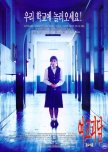‘Whispering Corridors’? More Like Talking Corridors…
In retrospect ‘ Whispering Corridors’ is an oddly anomaly of a film. Released the same year as its more critically-successful and spine-tingling Japanese counterpart ‘Ringu’( 1998) , Screenwriter and director Park Ki-Hyung had been pushing the idea of the movie for numerous years beforehand in order to compete with the rising success of Japanese horror “Yurei “ ( ghost) movies in the Asian-film industry. However ironically whilst ‘ Whispering Corridors’ was a domestic box-office hit the film was neither truly a “terrifying” or well-executed due to a consequence of its patchwork and baffling narrative.
The premise of the film revolves around a teacher at an all-girls school who after stumbling upon the bizarre death of a pupil at the school several years ago is mysteriously found dead the next morning in a seeming act of suicide. Gossip soon begins to spread around the school towards the building being haunted by a vengeful spirit which new intern Eun-young (Lee Mi-yeon) who is, in fact, an ex-pupil and friend of Jin-ju, takes it upon herself to investigate, and comes up not only against a murderous spirit, but more importantly against the corrupt practices of the school authorities.
The acting front of the film is admittedly satisfactory to say the least- its not bad per say and certainly decent enough to watch through scenes, but poorly-paced dialogue deliverances and delayed expression reaction rarely added vivid realism to these moments either.
The horror elements of ‘ Whispering Corridors’ often felt as though there were reluctantly added by Park Ki-Hyung. Of course they exist in theory throughout the film from the presence of the ghost and the urban legends but rarely did they lack two quintessential elements for a horror film; fear and suspense due to lacking build-up or connected points in the storyline . Consequently the overture of ‘ Whispering Corridors’ felt as though it was a parody of the horror genre; over-the-top screams, dark camera angles and the classic “ blood on the wall” lacking anything but dread as further “horror” scenes also seemed to suffer from a farcical existence in the movie also.
Instead ‘ Whispering Corridors’ often felt as though it was supposed to be a social critique - a message which was surprisingly highlighted substantially in the movie. Park Ki-Hung seemed to provide an inherently strong anti-authoritarian streak; openly speaking out against corporal punishment, the impossible strive for perfection and exam results as well as notable taboos in South-Korean popular culture such as lesbianism, assault and corruption.
However sadly rather than these more profound themes helping to tie down the loose ends of ‘ Whispering Corridors’ this instead spiralled a patchwork narrative to take root frontal stage of the film with sporadic-jumps between subplots, heavy dialogues and poor-editing resulting in the film’s pacing feeling tedious. The ending did little to serve a sense of completion or spine-tingling chills for viewers with the outcome feeling more anti-climatic than satiable.
Ki-Hyung’s hand at cinematography was admittedly dated in places through low-budget camera shots and egregious editing at times, but it is praiseworthy to note that Hyung did experiment a lot with early day filming - techniques into Korean cinema such as long shots, pan shots as well as fade sequences throughout the duration of the film ( which are all still widely used today in the South-Korean film industry.)
Overall Park Ki Hyung’s ‘ Whispering Corridors’ is the movie which would’ve arguably done better as a standalone social-commentary movie, than a marketed “horror-flick”. Whilst the movie did admittedly inspire future filmmakers through its box-office success and experiment with the early days of Korean horror in the film industry, the evident comparison between the poorly-paced and mind-numbing narrative with an absent scare factor against its more spine-tingling and suspenseful Japanese counterpart cannot help but come into effect afterwards
Was this review helpful to you?























